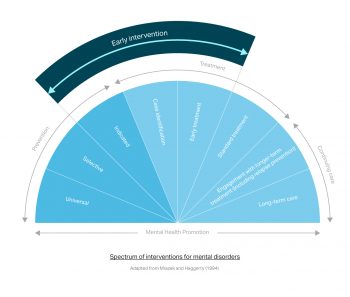What is early intervention in mental health
Early intervention (EI) in mental health is a simple concept drawing on a small number of principles: the prompt engagement, assessment and delivery of effective bio-psycho-social interventions to people at risk of or in the early stages of experiencing mental ill health, appropriate to the stage of their condition and their own developmental phase.
Characteristics of EI include striving to minimise treatment delays and maximise the prospects of recovery, reliance on evidence-based, systemically (family) inclusive and diagnostically agnostic methods delivered through multidisciplinary, expert services; EI can encompass primary or indicated preventative approaches.
Most comprehensively developed for psychotic illnesses arising largely in the second and third decades of life EI draws on models used in other domains such as heart disease, stroke and cancer where early treatment is accepted as crucial, and shares strong evidence of individual and cost benefits. The recent change of our organisation’s name from the International Early Psychosis Association to IEPA: Early Intervention in Mental Health reflects our efforts to expand the approach beyond psychosis to other mental health disorders and to other stages of the life course.
